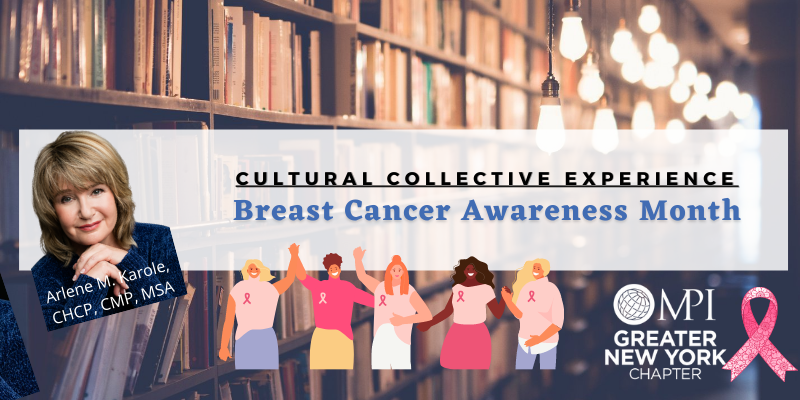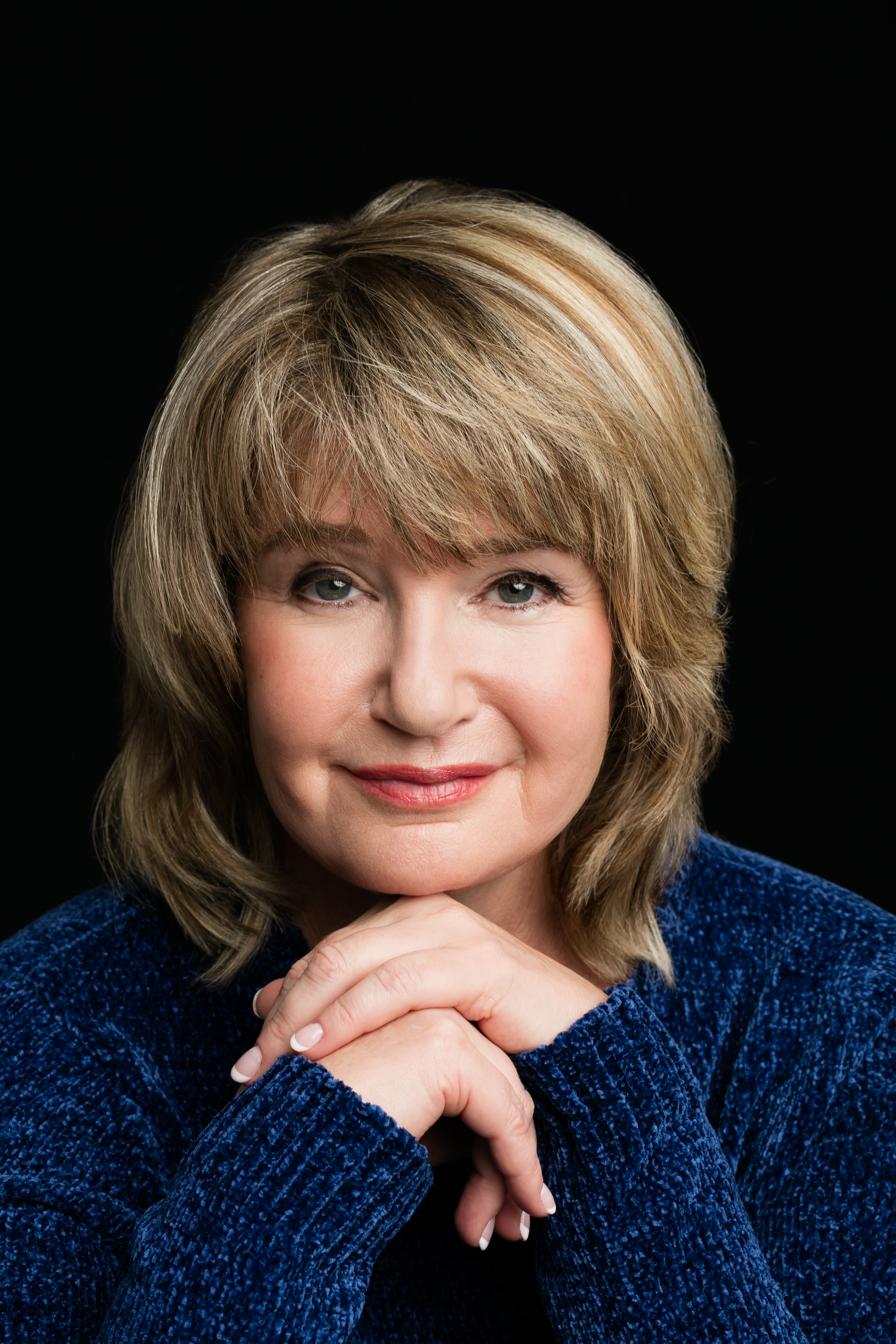February 19, 2026
MPIGNY is bringing Mardi Gras to NYC this winter!
SAVE MY SEAT
July 23, 2026
Join MPI Greater New York for our annual Golf Outing!
SAVE THE DATE

Just Diagnosed: Breast Cancer. An Illuminating Journey.

As October’s focus is on breast cancer, diversity, and inclusivity, I’m grateful to have been invited by Meeting Professionals International Greater New York Chapter (MPIGNY) to reflect on these two very important timely and relevant topics.
Living Through Breast Cancer During a Global Pandemic
To begin, I must share that back in March of 2020, when COVID-19 was first announced as a fast-spreading global pandemic, I recall reading and hearing numerous reports that due to the high admission of COVID patients into our hospitals many other procedures were put on “hold.”
In particular, I remember hearing those scheduled for a breast surgery were told that it was an elective procedure. At the time, as a breast cancer survivor of five years, I recalled my initial diagnosis back in March of 2015 and hearing my breast surgeon say those three words, “You have cancer.” It was absolutely terrifying.
I could not help but think of those who were just diagnosed, scheduled for surgery, and then told their surgery would be delayed. Of course, I understood the great urgency the COVID virus presented — hospitals having to re-prioritize resources, patients, and cases, and make difficult decisions, ranking first those in the direst health. Yet, at the same time I could not have imagined waiting and delaying my own surgery. I was riddled with anxiety and fear and just wanted the cancer out of my body as quickly as possible.
As the pandemic continued on, I started to realize breast cancer and COVID have somethings very much in common. Both have a societal impact and present disparities and inequities toward particular demographics. However, with the aggressive incursion of COVID into our lives, those disparities were quickly made apparent. While with breast cancer, not so much so.
A few statistics:
According to breastcancer.org, “White women are slightly more likely to develop breast cancer than Black, Hispanic, and Asian women. Black women are more likely to develop more aggressive, more advanced-stage breast cancer that is diagnosed at a young age. Black women are also more likely to die from breast cancer.”
According to Susan G. Komen “Hispanic/Latina women are more likely than white women to be diagnosed with late-stage breast cancers. They also tend to have larger tumors than white women. Breast cancer incidence is lower among Asian/Pacific Islander women than for white and black women.”
While reasons for these differences and outcomes may vary and the “why” debated, it’s clear these disparities and inequities exist.
My Diagnosis
So there I was, at forty-nine…who would have thought that instead of planning for my fiftieth birthday, I would be planning for a mastectomy of my right breast? Really!
I had a pinprick-like feeling (literally like someone taking a pin and pricking my skin with it) in my right breast. After a couple of visits to the gynecologist, she sent me over to a breast surgeon. After three tests including two mammograms and one ultrasound all showed “normal,” I was leaving my breast surgeon’s office, with my hand literally on the door, I looked back at her and said “I’m telling you, something’s not right…[but] if you tell me everything’s fine, then everything’s fine, and I’m walking out the door.” She then said “Wait,” and sent me for an MRI.
It was only then, after the MRI, as I sat on the train home from work, my cell phone rang. It was my surgeon’s office calling to tell me my MRI “lit up” and we needed to schedule more tests.
The initial three tests missed the cancer, what I would soon learn was called “ductal carcinoma in situ” or DCIS. A flurry of more tests followed by two breast needle biopsies that would confirm the large extent of the DCIS, further missed the fact that I already had stage 1A invasive cancer (which my oncologist shared with me post-surgery.)
Armed with the knowledge that my DCIS was extensive and my own diligent research, and factoring in a myriad other information, just two months before my fiftieth birthday, I headed into surgery for a mastectomy of my right breast.
Finding Meaning in the Journey
Today, over six years since that day, I am thriving and doing great. I have come to find all these years later, breast cancer is a lifelong journey; and while my diagnosis was devastating, if I had the chance to go back and change it, I would not change a thing.
Such as a global pandemic has brought life to a screeching halt and made us look inwards in the silence and absence of the noise of everyday life as we knew it, hearing those three words “you have cancer” is jarring but helped me change my life for the better. I reevaluated and changed my diet, exercise regimen and lifestyle choices focusing more on health and wellness, every day. Whether eating better foods, doing yoga or mediation, or biking, I’ve researched and found many excellent resources including books, videos, blogs and podcasts that have supported the new positive changes I have made in survivorship.
A driven type A New Yorker, and a self-professed multi-tasking wizard, I try to stay in the present moment, to just BE in the now and not stress. It does take effort to change patterns learned over a lifetime, but with focus and a desire to change, I have found we can do anything we choose to and create anew.
A favorite quote of mine is “Everything can be taken from a man but one thing: the last of human freedoms—to choose one’s attitude in any given set of circumstances, to choose one’s own way.” —Viktor Frankl
Advocacy and Lessons Learned
As an educator in a large health system doing continuing medical education, I have seen a lot. So, I know how important it is for people to advocate for themselves. I am now an advocate and share my experiences to help others with their initial diagnosis and in survivorship.
My volunteer work with SHARE national breast cancer organization and as a member of the National Consortium of Breast Centers (NCBC) and on the National Consortium of Breast Centers Conference Survivorship Planning Subcommittee (NCoBC) helps keep me up-to-date and knowledgeable. I am humbled to be able to serve and help others through my personal experiences. I came to learn breast cancer does not discriminate by gender, age, race, borders, celebrity, or how high you have climbed on the corporate ladder.
Whether facing a cancer diagnosis or any other health issue, here are a few lessons I benefitted from and you may too:
Listen to your body. That slight little pinprick made me go to the doctor. And thank goodness I did. I knew something wasn’t right, and I didn’t stop until we knew what it was. Follow your instincts because they’re usually right. Even if you’re scared to know the outcome. I always say isn’t it better to find out what it is, so you can do something as early as possible to address it? Or in fact maybe find out it’s nothing at all!
Do your own research. I have found people seem to do more research when we are deciding which restaurant to order take-out from then putting the time into our own health and wellness.
If your doctor wants you to have a test, ask what it’s for and the possible benefits and risks or side effects.
Whenever I received an MRI, ultrasound, X-ray or other, I always got the report and researched what the results were myself. Then asked my doctors to review the tests with me. With that said, I do stress that while there is excellent information available to us on numerous platforms, there is also misinformation as well. Make sure you are researching credible resources and that the information is based in scientific evidence. Two wonderful resources I found were breastcancer.org and nccn.org National Comprehensive Cancer Network.
I always say, “Own your diagnosis, don’t let it own you.” In great part, one of the ways I started to take ownership of my diagnosis and feel a sense of control was not just relegating and delegating my diagnosis to others but by seeking knowledge and researching.
Don’t go it alone. Connecting with others who have gone through the process not only helps you feel less isolated, it can also help enlighten you on treatment options. Several friends had been through the same surgeries I was considering and guided me through the pros and cons of each. I also found it helpful to bring a friend to doctors’ appointments. She asked questions that I was either too afraid or too overwhelmed to ask. Share www.sharecancersupport.org/ was one of my favorite groups to help me connect with others.
*******
Sources:
- https://www.breastcancer.org/risk/factors/race_ethnicity
- https://www.komen.org/uploadedFiles/_Komen/Content/About_Breast_Cancer/Tools_and_Resources/Fact_Sheets_and_Breast_Self_Awareness_Cards/Racial%20and%20Ethnic%20Differences.pdf
Breast Cancer Research Foundation

Leave a commentOrder by
Newest on top Oldest on top